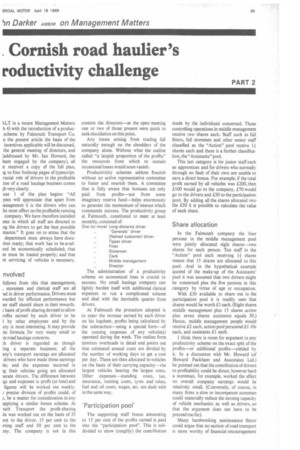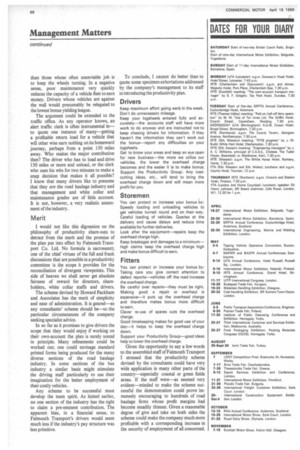Darker AMBIA4 on Management Matters
Page 71

Page 72

If you've noticed an error in this article please click here to report it so we can fix it.
Cornish road haulier's
roductivity challenge PART 2
LT in a recent Management Matters h 4) with the introduction of a producscheme by Falmouth Transport Co. n the present article the basis of the incentives applicable will be discussed. the general meeting of directors, and (addressed by Mr. Ian Howard, the ltant engaged by the company), all it received a copy of the full plan, lg to four foolscap pages of typescript. rucial role of drivers in the profitable :ion of a road haulage business comes th very clearly.
use 1 of the plan begins: "All yees will appreciate that apart from lanagement it is the drivers who can he most effect on the profitable running company. We have therefore installed :me in which all staff are directed to ng the drivers to get the best possible mance." It goes on to stress that the department must always have docution ready; that work has to be availand be economically scheduled; that es must be loaded properly; and that nt servicing of vehicles is necessary.
nvolved
follows from this that management, storemen and clerical staff are all 'ed in driver performance. Drivers must warded for efficient performance but zer staff should share in their rewards. basis of profit sharing devised to allow rofits earned by each driver to be I by other employees and by the any is most interesting. It may provide )1e formula for very many small to m road haulage concerns.
:11 driver is regarded as though ting a separate business; all the any's transport earnings are allocated drivers who have made those earnings )1e; and the expenses incurred in ig their vehicles going are allocated iarate drivers. The difference between tgs and expenses is profit (or loss) and figures will be worked out weekly. : precise division of profits could, of be a matter for consideration in any applying a similar bonus scheme. At xith Transport the profit-sharing tla was worked out on the basis of 35 ent to the driver, 15 per cent to the Irting staff and 50 per cent to the my. The company is not in this
context the directors—at the open meeting one or two of those present were quick to seek elucidation on this point_ Any losses arising from trading fall naturally enough on the shoulders of the company alone. Without what the outline called "a largish proportion of the profits" the resources from which to sustain occasional losses would soon vanish.
Productivitity schemes seldom flourish without an active representative committee to foster and nourish them. A committee that is fully aware that bonuses are only paid from profits—not from some imaginary reserve fund—helps enormously to generate the momentum of interest which commands success. The productivity group at Falmouth, constituted to meet at least monthly, consisted of:
One tor more) Long-distance driver
"Generals" driver (Named customer) driver Tipper driver Fitter Storeman Clerk Middle management Di rector
The administration of a productivity scheme on economical lines is crucial to success. No small haulage company can lightly burden itself with additional clerical expenses to run a complicated scheme and deal with the inevitable queries from drivers.
At Falmouth the procedure adopted is to enter the revenue earned by each driver on his logsheet, profits being calculated by the subtraction—using a special form—of the running expenses of any vehicle(s) operated during the week. The outline form itemizes overheads in detail and points out that estimated annual costs are divided by the number of working days to get a cost per day. These are then allocated to vehicles on the basis of their carrying capacity--the largest vehicles bearing the largest costs. Other expenses—standing costs, tax, insurance, running costs, tyres and tubes, fuel and oil costs, wages, etc. are dealt with in the same way.
'Participation pool'
The supporting staff bonus amounting to 15 per cent of the profits earned is paid into the "participation pool". This is subdivided to show (roughly) the contribution made by the individuals concerned. Those controlling operations in middle management receive two shares each. Staff such as full fitters, full storemen and other senior staff classified as the "Action" pool receive 1+ shares each and there is a further classification, the "Assistants" pool.
This last category is for junior staff such as apprentices and for drivers who normally through no fault of their own are unable to earn a direct bonus. For example, if the total profit earned by all vehicles was £200, then £100 would go to the company, £70 would go to the drivers and £30 to the participation pool. By adding all the shares allocated into the £30 it is possible to calculate the value of each share.
Share allocation In the Falmouth company the four persons in the middle management pool were jointly allocated eight shares—two shares for each person. Ten staff in the "Action" pool each receiving Hshares means that 15 shares are allocated to this pool. And in the hypothetical example quoted of the make-up of the Assistants' pool it was assumed that two drivers might be concerned plus the five persons in this category by virtue of age or occupation.
With £30 available to share out in the participation pool it is readily seen that shares would be worth £1 each. (Eight shares middle management plus 15 shares action plus seven shares assistants equals 30.) Hence, middle management people would receive £2 each, action pool personnel £1 lOs each, and assistants £1 each.
I think there is room for argument in any productivity scheme on the exact split of the profits—or additional profits—yielded by it. In a discussion with Mr. Howard (of Howard Packham and Associates Ltd.) he pointed out that the contribution of drivers to profitability could be direct; however hard a storeman, for example, worked the effect on overall company earnings would be relatively small. (Conversely, of course, in many firms a slow or incompetent storeman could materially reduce the earning capacity of vehicle mechanics as well as drivers, so that the argument does not have to be pressed too far).
Many hardworking maintenance fitters could argue that no section of road transport is more worthy of financial encouragement than those whose often unenviable job is to keep the wheels turning. In a negative sense, poor maintenance very quickly reduces the capacity of a vehicle fleet to earn money. Drivers whose vehicles are against the wall would presumably be relegated to the lowest bonus yielding league.
The argument could be extended to the traffic office. As any operator knows, an alert traffic clerk is often instrumental into quote one instance of many—getting a profitable return load for a vehicle that will other wise earn nothing on its homeward journey, perhaps from a point 150 miles away. Who makes the major contribution then? The driver who has to load and drive 150 miles or more and unload, or the clerk who uses his wits for two minutes to make a snap decision that makes it all possible? I know that many drivers like to presume that they are the road haulage industry and that management and white collar and maintenance grades are of little account. It is not, however, a very realistic assessment of the industry.
Merit
I would not like this digression on the philosophy of productivity share-outs to detract from the merit and the promise of the plan put into effect by Falmouth Transport Co. Ltd. No formula is sacrosanct; one of the chief virtues of the full and frank discussions that are possible in a productivity committee is the scope it provides for the reconciliation of divergent viewpoints. This side of heaven we shall never get absolute fairness of reward for directors, shareholders, white collar staffs and drivers.
The scheme devised by Howard Packham and Associates has the merit of simplicity and ease of administration. It is geared—as any consultants' scheme should be—to the particular circumstances of the company seeking specialist advice.
In so far as it promises to give drivers the scope that they would enjoy if working on their own-account the plan is surely sound in principle. Many refinements could be worked out; one could envisage standard printed forms being produced for the many diverse sections of the road haulage industry. In some sections of the bus industry a similar basis might stimulate the driving staff particularly to use their imagination for the better employment of their costly vehicles.
Any scheme to be successful must develop the team spirit. As hinted earlier, no one section of the industry has the right to claim a pre-eminent contribution. The apparent bias, in a financial sense, to Falmouth Transport's drivers would seem much less if the industry's pay structure was .less primitive. To conclude, I cannot do better than to quote some specimen exhortations addressed by the company's management to its staff in introducing the productivity plan.
Drivers
Keep maximum effort going early in the week. Don't do unnecessary mileage.
Keep your logsheets entered fully and accurately—the accounts staff will have more work to do anyway and are instructed not to keep chasing drivers for information. If they haven't the information they can't work out the bonus—report any difficulties on your I ogsheets.
Get to know your areas and keep an eye open for new business—the more we utilize our vehicles, the lower the overhead charge becomes and the easier it is to make bonus. Support the Productivity Group: Any costcutting ideas, etc., will tend to bring the overhead charge down and will mean more profit for you.
Storemen
You can protect or increase your bonus by: Speedy loading and unloading vehicles to get vehicles turned round and on their way. Careful loading of vehicles. Queries at the delivery end cause delays and reduce time available for further deliveries.
Look after the equipment—repairs keep the overhead charge high.
Keep breakages and damages to a minimum— high claims keep the overhead charge high and make bonus difficult to earn.
Fitters
You can protect or increase your bonus by: Taking care you give correct attention to defect reports—vehicles off the road increase the overhead charge, Be careful over repairs—they must be right. Making good a repair or overhaul is expensive—it puts up the overhead charge and therefore makes bonus more difficult to earn.
Clever re-use of spares cuts the overhead charge.
Good timekeeping makes for good use of your day—it helps to keep the overhead charge down.
Support your Productivity Group—good ideas help to lower the overhead charge.
Given the opportunity to say a few words to the assembled staff of Falmouth Transport I stressed that the productivity scheme devised by the consultants could have very wide application in many other parts of the country—especially coastal or green fields areas. If the staff were—as seemed very evident—minded to make the scheme successful the demonstration could prove immensely encouraging to hundreds of road haulage firms whose profit margins had become steadily thinner. Given a reasonable degree of give and take on both sides the scheme could make the company much more profitable with a corresponding increase in the security of employment of all concerned.
































































































































